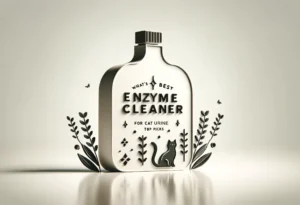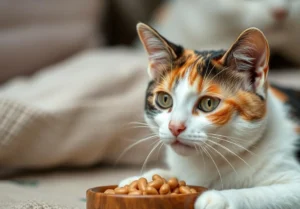Cats and cheese seem like a perfect match, but have you ever wondered why your feline friend shouldn’t indulge in this dairy delight? Let’s explore why cats can’t have cheese.
Lactose Intolerance in Cats
Most cats are lactose intolerant, meaning they lack the enzyme needed to digest dairy products like cheese properly. When cats consume cheese, it can lead to digestive issues such as diarrhea, stomach cramps, and bloating. Just like humans who are lactose intolerant, cats can have unpleasant reactions to dairy products.
High Fat Content in Cheese
Feeding cheese to your feline friend may seem like a treat, but it can actually be harmful due to its high fat content. Excessive fat in a cat’s diet can lead to obesity and a higher risk of health issues like pancreatitis. Remember, cats are obligate carnivores, and a diet too high in fat can be detrimental to their overall health.
Unique Insight: While some cats may tolerate small amounts of cheese without any noticeable side effects, it’s essential to remember that it’s still not a nutritious or necessary part of their diet. Always consult with your veterinarian before introducing any new foods to your cat’s diet, especially dairy products like cheese.
Sodium Levels in Cheese
Did you know that cheese is a sneaky source of high sodium levels? While we humans might enjoy a cheesy treat, it’s not the best option for our feline friends. Excess sodium in cheese can lead to kidney issues and dehydration in cats. Their bodies aren’t equipped to handle salty snacks like we can. So, next time your kitty begs for a bite of your cheese, opt for a safer treat that won’t put their health at risk.
Potential Allergic Reactions
Cheese might be a flavorful delight for us, but it can spell trouble for your four-legged pal. Some cats can have allergic reactions to cheese, causing symptoms like vomiting, diarrhea, or skin issues. It’s best to avoid giving your kitty dairy products if you notice these signs after indulging them in a cheesy snack. Be a mindful pet parent and keep your furry friend’s health a top priority.
- Lactose Intolerance: Cats are lactose intolerant, meaning their bodies have a tough time digesting lactose, a sugar in dairy products. This intolerance can lead to gastrointestinal issues if cheese is consumed. Be aware of this sensitivity and choose treats that won’t upset your cat’s tummy.
Unsafe Additives in Cheese
Did you know that some cheeses contain additives like onion, garlic, or chives that are harmful to our feline friends? While cheese itself is not toxic to cats, these additives can cause serious health issues like gastrointestinal problems, anemia, or even organ damage. To keep your furry companion safe and healthy, it’s best to steer clear of feeding them cheese with any questionable ingredients.
Alternatives to Cheese for Cats
If your cat has a hankering for a tasty treat but you want to avoid cheese, fret not! There are plenty of safe and healthy alternatives that your feline friend will love. Consider offering cooked lean meats like chicken or turkey as a protein-rich snack. You can also opt for cat-friendly treats specifically designed to meet their dietary needs. These options will satisfy their craving without putting their health at risk.
Other safe alternatives
- Plain, unsalted canned tuna
- Small amounts of plain, cooked fish
- Cooked eggs (no seasoning)
- Freeze-dried meat treats
Remember, a well-balanced diet is key to keeping your cat happy and healthy. By choosing safe alternatives to cheese, you can spoil your feline friend without any worries.
Cheese Trivia
Did you know that cheese is a great source of protein and calcium for humans, but it can be harmful to cats? While many feline friends may have a love for dairy, their digestive systems aren’t equipped to handle lactose found in cheese and other dairy products. This can lead to stomach upset, diarrhea, or even more severe issues for your furry companion.
Here’s a fun fact: Cats lack sufficient amounts of lactase, the enzyme needed to break down lactose in milk products. This means that giving your cat cheese could result in an upset stomach or gastrointestinal distress. So, while it might be tempting to share your favorite snack with your feline friend, it’s best to stick to treats specifically made for cats to keep them happy and healthy.
Fun Cheese Facts
- Cheddar Gorge in England is the birthplace of Cheddar cheese, which is one of the most popular cheese varieties worldwide.
- Cheese Rolling Festival: In the town of Gloucestershire, England, there’s a centuries-old tradition where people chase a wheel of cheese down a steep hill.
- The World’s Largest Cheese: In 2010, a Wisconsin dairy plant produced a 34,591-pound block of cheddar, making it the world’s largest cheese.
Remember, as much as your cat may beg for a taste of your cheese, it’s best to keep this dairy delight away from their curious whiskers to ensure their well-being. Stick to feline-friendly treats to keep your pet happy and healthy.
Alex, a passionate animal lover, has experience in training and understanding animal behavior. As a proud pet parent to two dogs and three cats, he founded AnimalReport.net to share insights from animal experts and expand his knowledge of the animal kingdom.




